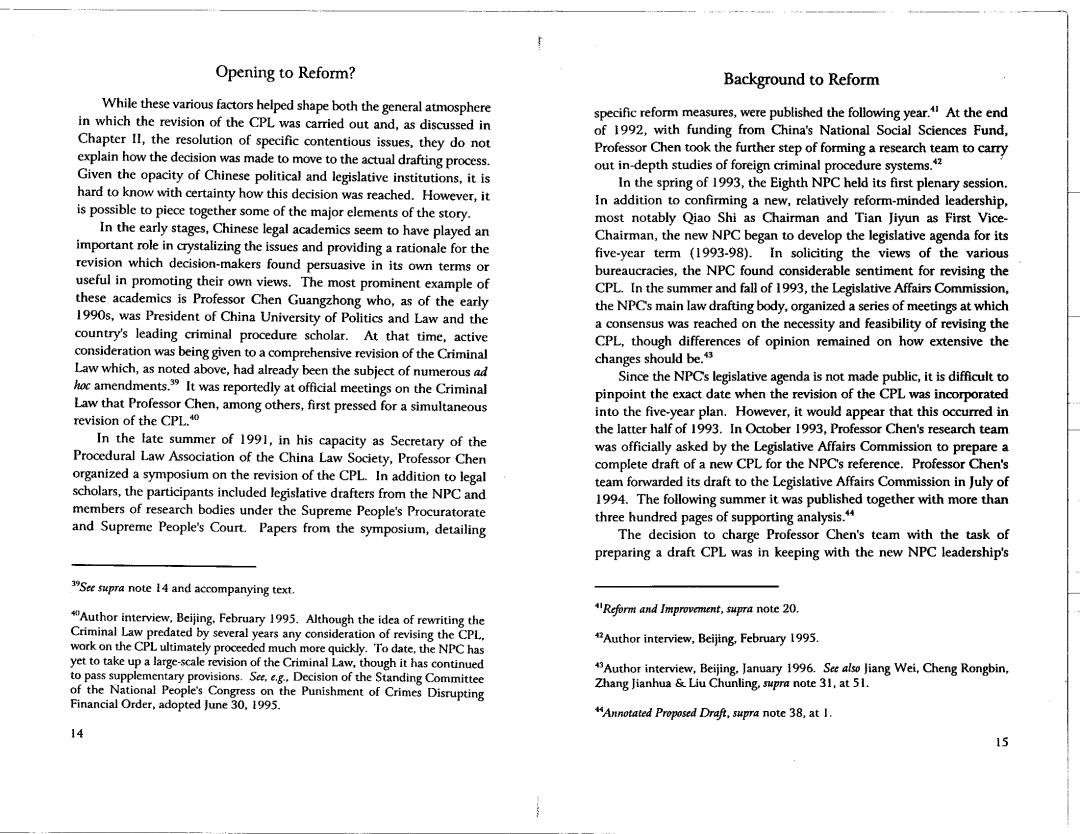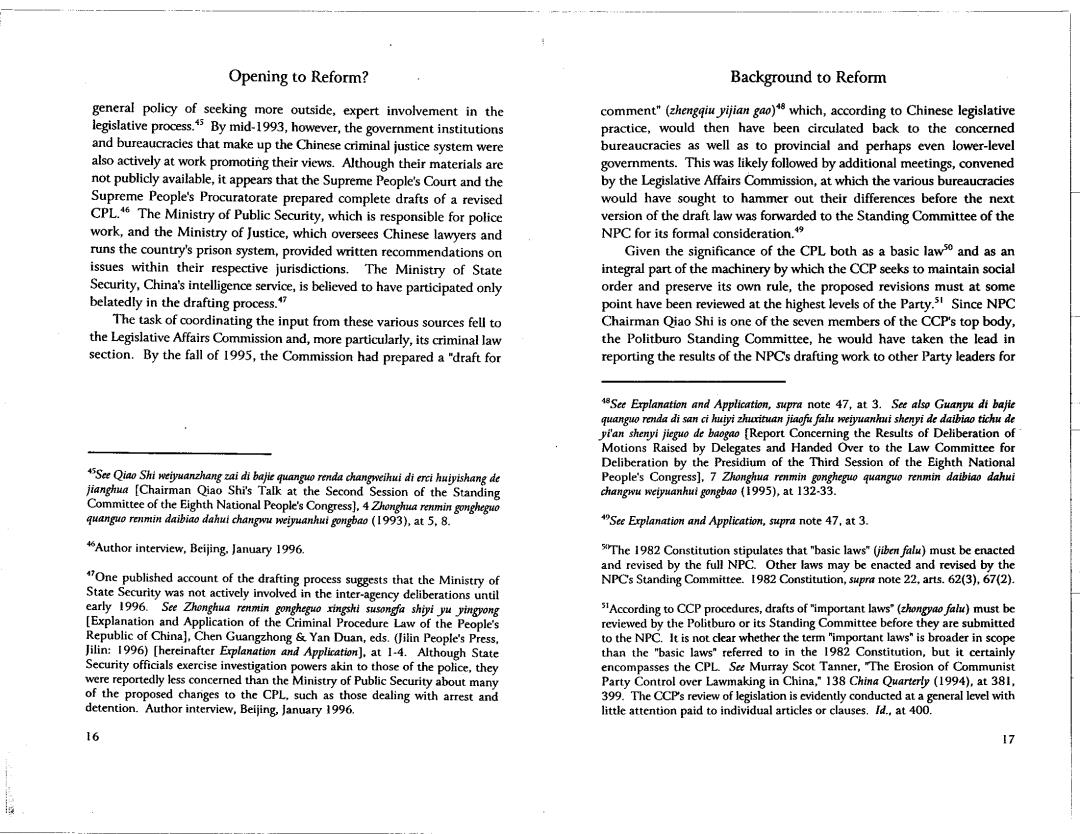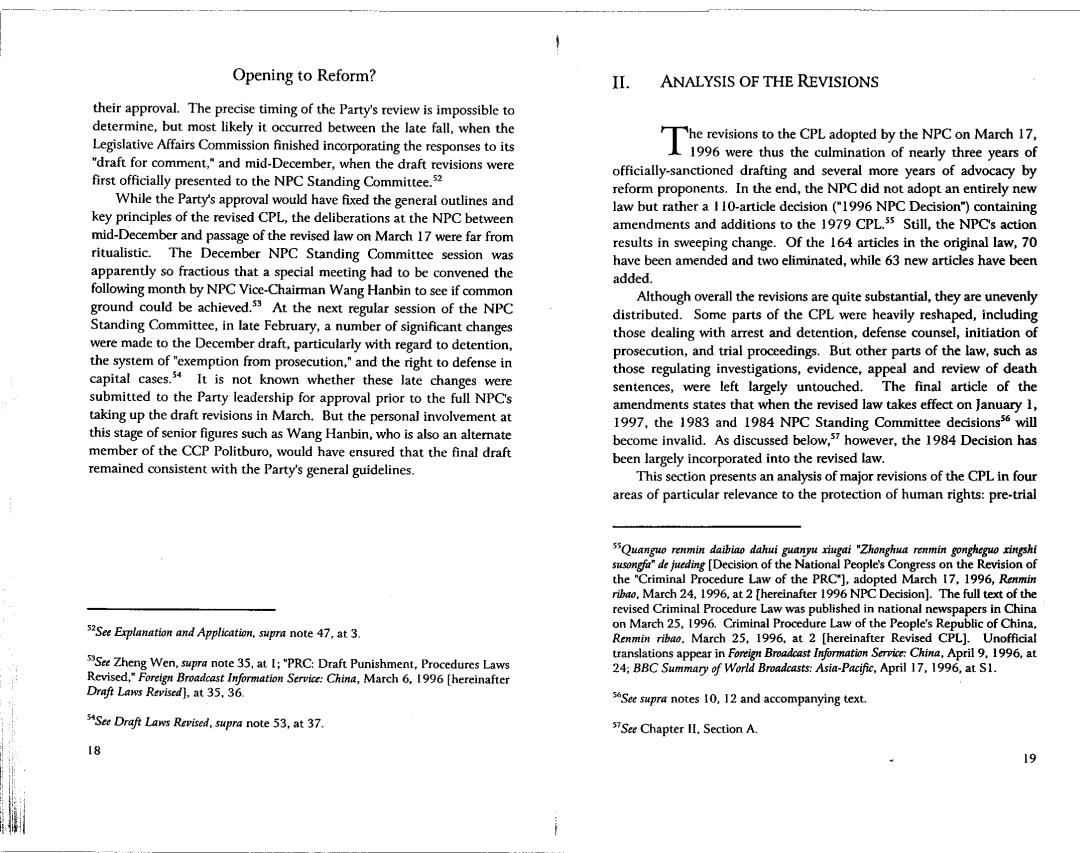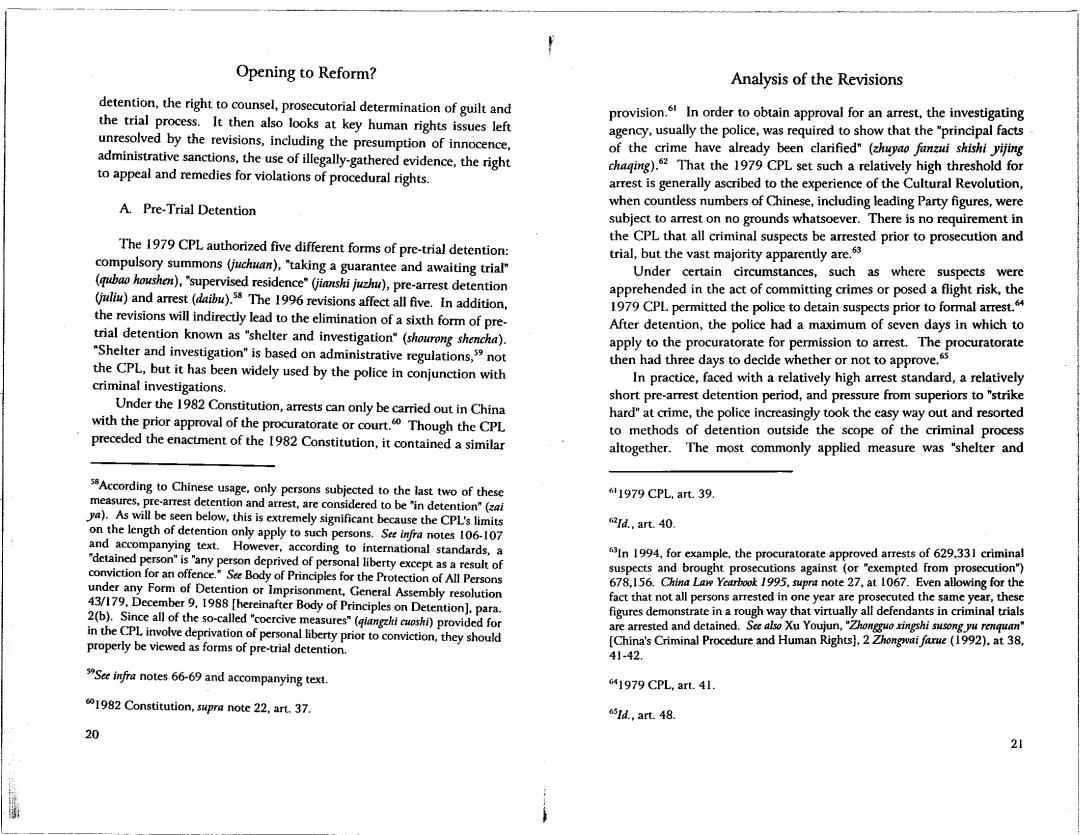
Opening to Reform? Background to Reform While these various factors helped shape both the general atmosphere in which the revision of the CPL was carried out and,as discussed in specific reform measures,were published the following year.1 At the end Chapter Il,the resolution of specific contentious issues,they do not of 1992,with funding from China's National Social Sciences Fund, explain how the decision was made to move to the actual drafting process. Professor Chen took the further step of forming a research team to carry Given the opacity of Chinese political and legislative institutions,it is out in-depth studies of foreign criminal procedure systems.2 In the spring of 1993,the Eighth NPC held its first plenary session. hard to know with certainty how this decision was reached.However,it In addition to confirming a new,relatively reform-minded leadership, is possible to piece together some of the major elements of the story. most notably Qiao Shi as Chairman and Tian Jiyun as First Vice- In the early stages,Chinese legal academics seem to have played an Chairman,the new NPC began to develop the legislative agenda for its important role in crystalizing the issues and providing a rationale for the five-year term (1993-98).In soliciting the views of the various revision which decision-makers found persuasive in its own terms or bureaucracies,the NPC found considerable sentiment for revising the useful in promoting their own views.The most prominent example of CPL.In the summer and fall of 1993,the Legislative Affairs Commission, these academics is Professor Chen Guangzhong who,as of the early 1990s,was President of China University of Politics and Law and the the NPCs main law drafting body,organized a series of meetings at which a consensus was reached on the necessity and feasibility of revising the country's leading criminal procedure scholar.At that time,active CPL,though differences of opinion remained on how extensive the consideration was being given to a comprehensive revision of the Criminal Law which,as noted above,had already been the subject of numerous ad changes should be.43 Since the NPCs legislative agenda is not made public,it is difficult to hoc amendments.3 It was reportedly at official meetings on the Criminal Law that Professor Chen,among others,first pressed for a simultaneous pinpoint the exact date when the revision of the CPL was incorporated revision of the CPL.10 into the five-year plan.However,it would appear that this occurred in the latter half of 1993.In October 1993,Professor Chen's research team In the late summer of 1991,in his capacity as Secretary of the Procedural Law Association of the China Law Society,Professor Chen was officially asked by the Legislative Affairs Commission to prepare a organized a symposium on the revision of the CPL.In addition to legal complete draft of a new CPL for the NPC's reference.Professor Chen's scholars,the participants included legislative drafters from the NPC and team forwarded its draft to the Legislative Affairs Commission in July of members of research bodies under the Supreme People's Procuratorate 1994.The following summer it was published together with more than and Supreme People's Court.Papers from the symposium,detailing three hundred pages of supporting analysis.4 The decision to charge Professor Chen's team with the task of preparing a draft CPL was in keeping with the new NPC leadership's aSee supra note 14 and accompanying text. Author interview,Beijing.February 1995.Although the idea of rewriting the Reform and Improvement,supra note 20. Criminal Law predated by several years any consideration of revising the CPL. work on the CPL ultimately proceeded much more quickly.To date,the NPC has Author interview,Beijing,February 1995. yet to take up a large-scale revision of the Criminal Law,though it has continued to pass supplementary provisions.See.e.g Decision of the Standing Committee Author interview,Beijing,January 1996.See also Jiang Wei,Cheng Rongbin, of the National People's Congress on the Punishment of Crimes Disrupting Zhang Jianhua Liu Chunling,supra note 31.at 51. Financial Order,adopted June 30.1995. MAnnotated Proposed Draft,supra note 38.at I. 14 15

Opening to Reform? Background to Reform general policy of seeking more outside,expert involvement in the comment"(zhengqiu yijian gao)which,according to Chinese legislative legislative process.By mid-1993,however,the govemnment institutions practice,would then have been circulated back to the concerned and bureaucracies that make up the Chinese criminal justice system were bureaucracies as well as to provincial and perhaps even lower-level also actively at work promoting their views.Although their materials are governments.This was likely followed by additional meetings,convened not publicly available,it appears that the Supreme People's Court and the by the Legislative Affairs Commission,at which the various bureaucracies Supreme People's Procuratorate prepared complete drafts of a revised would have sought to hammer out their differences before the next CPL.6 The Ministry of Public Security,which is responsible for police version of the draft law was forwarded to the Standing Committee of the work,and the Ministry of Justice,which oversees Chinese lawyers and NPC for its formal consideration. runs the country's prison system,provided written recommendations on Given the significance of the CPL both as a basic lawso and as an issues within their respective jurisdictions.The Ministry of State integral part of the machinery by which the CCP seeks to maintain social Security,China's intelligence service,is believed to have participated only order and preserve its own rule,the proposed revisions must at some belatedly in the drafting process. point have been reviewed at the highest levels of the Party.s!Since NPC The task of coordinating the input from these various sources fell to Chairman Qiao Shi is one of the seven members of the CCP's top body, the Legislative Affairs Commission and,more particularly,its criminal law the Politburo Standing Committee,he would have taken the lead in section.By the fall of 1995,the Commission had prepared a"draft for reporting the results of the NPC's drafting work to other Party leaders for ASee Explanation and Application,supra note 47,at 3.See also Guanyu di bajie quanguo renda di san ci huiyi zhurituan jiaofu falu weiyuanhui shenyi de daibiao tichu de yi'an shenyi jieguo de baogao [Report Concerning the Results of Deliberation of Motions Raised by Delegates and Handed Over to the Law Committee for Deliberation by the Presidium of the Third Session of the Eighth National See Qiao Shi weiyuanzhang zai di bajie quanguo renda changweihui di erci huiyishang de People's Congress].7 Zhonghua renmin gongheguo quanguo renmin daibiao dahui jianghua [Chairman Qiao Shi's Talk at the Second Session of the Standing changwu weiyuanhui gongbao (1995),at 132-33. Committee of the Eighth National People's Congress].4 Zhonghua renmin gongheguo quanguo renmin daibiao dahui changwu weiyuanhui gongbao (1993),at 5.8. See Explanation and Application,supra note 47.at 3. 4Author interview,Beijing.January 1996. The 1982 Constitution stipulates that"basic laws"(jiben falu)must be enacted and revised by the full NPC.Other laws may be enacted and revised by the One published account of the drafting process suggests that the Ministry of NPC's Standing Committee.1982 Constitution,supra note 22,arts.62(3),67(2). State Security was not actively involved in the inter-agency deliberations until early 1996.See Zhonghua renmin gongheguo xingshi susongfa shiyi yu yingyong SIAccording to CCP procedures,drafts of "important laws"(zhongyo fal)must be [Explanation and Application of the Criminal Procedure Law of the People's reviewed by the Politburo or its Standing Committee before they are submitted Republic of China].Chen Guangzhong Yan Duan,eds.(Jilin People's Press. to the NPC.It is not clear whether the term "important laws"is broader in scope Jilin:1996)[hereinafter Explanation and Application].at 1-4.Although State than the "basic laws"referred to in the 1982 Constitution,but it certainly Security officials exercise investigation powers akin to those of the police,they encompasses the CPL.See Murray Scot Tanner,"The Erosion of Communist were reportedly less concerned than the Ministry of Public Security about many Party Control over Lawmaking in China,"138 China Quarterly (1994),at 381, of the proposed changes to the CPL.such as those dealing with arrest and 399.The CCPs review of legislation is evidently conducted at a general level with detention.Author interview,Beijing,January 1996. little attention paid to individual articles or clauses.Id.,at 400. 16 17

Opening to Reform? II. ANALYSIS OF THE REVISIONS their approval.The precise timing of the Party's review is impossible to determine,but most likely it occurred between the late fall,when the he revisions to the CPL adopted by the NPC on March 17, Legislative Affairs Commission finished incorporating the responses to its 1996 were thus the culmination of nearly three years of "draft for comment,"and mid-December,when the draft revisions were first officially presented to the NPC Standing Committee.52 officially-sanctioned drafting and several more years of advocacy by reform proponents.In the end,the NPC did not adopt an entirely new While the Party's approval would have fixed the general outlines and law but rather a 110-article decision("1996 NPC Decision")containing key principles of the revised CPL,the deliberations at the NPC between amendments and additions to the 1979 CPL.s5 Still,the NPC's action mid-December and passage of the revised law on March 17 were far from ritualistic.The December NPC Standing Committee session was results in sweeping change.Of the 164 articles in the original law,70 have been amended and two eliminated,while 63 new articles have been apparently so fractious that a special meeting had to be convened the added. following month by NPC Vice-Chairman Wang Hanbin to see if common ground could be achieved.53 At the next regular session of the NPC Although overall the revisions are quite substantial,they are unevenly distributed.Some parts of the CPL were heavily reshaped,including Standing Committee,in late February,a number of significant changes those dealing with arrest and detention,defense counsel,initiation of were made to the December draft,particularly with regard to detention, prosecution,and trial proceedings.But other parts of the law,such as the system of "exemption from prosecution,"and the right to defense in capital cases.54 It is not known whether these late changes were those regulating investigations,evidence,appeal and review of death sentences,were left largely untouched.The final article of the submitted to the Party leadership for approval prior to the full NPC's taking up the draft revisions in March.But the personal involvement at amendments states that when the revised law takes effect on January 1, 1997,the 1983 and 1984 NPC Standing Committee decisionsss will this stage of senior figures such as Wang Hanbin,who is also an alternate become invalid.As discussed below,s7 however,the 1984 Decision has member of the CCP Politburo,would have ensured that the final draft been largely incorporated into the revised law. remained consistent with the Party's general guidelines. This section presents an analysis of major revisions of the CPL in four areas of particular relevance to the protection of human rights:pre-trial s5Quanguo renmin daibiao dahui guanyu xiugai "Zhonghua renmin gongheguo xingshi susongfa"de jueding [Decision of the National People's Congress on the Revision of the "Criminal Procedure Law of the PRC"],adopted March 17,1996,Renmin ribao,March 24,1996.at 2 [hereinafter 1996 NPC Decision].The full text of the revised Criminal Procedure Law was published in national newspapers in China s2See Explanation and Application.supra note 47,at 3. on March 25,1996.Criminal Procedure Law of the People's Republic of China, Renmtin ribao.March 25,1996,at 2 [hereinafter Revised CPL].Unofficial SSee Zheng Wen,supra note 35,at I;"PRC:Draft Punishment,Procedures Laws tanslations appear in Foreign Broadcast Information Service:China.April 9.1996,at Revised,"Foreign Broadcast Information Service:China,March 6,1996 [hereinafter 24:BBC Summary of World Broadcasts:Asia-Pacific,April 17,1996,at S1. Draft Laws Revised),at 35,36. s6See supra notes 10,12 and accompanying text. SSee Draft Laws Revised,supra note 53,at 37. 57See Chapter II.Section A. 18 19

Opening to Reform? Analysis of the Revisions detention,the right to counsel,prosecutorial determination of guilt and the trial process.It then also looks at key human rights issues left provision.In order to obtain approval for an arrest,the investigating unresolved by the revisions,including the presumption of innocence, agency,usually the police,was required to show that the"principal facts administrative sanctions,the use of illegally-gathered evidence,the right of the crime have already been clarified"(zhuyao fanzui shishi yijing to appeal and remedies for violations of procedural rights. chaging).2 That the 1979 CPL set such a relatively high threshold for arrest is generally ascribed to the experience of the Cultural Revolution, A.Pre-Trial Detention when countless numbers of Chinese,including leading Party figures,were subject to arrest on no grounds whatsoever.There is no requirement in The 1979 CPL authorized five different forms of pre-trial detention: the CPL that all criminal suspects be arrested prior to prosecution and compulsory summons (juchuan),"taking a guarantee and awaiting trial" trial,but the vast majority apparently are. (qubao houshen),"supervised residence"(jianshi juzhu),pre-arrest detention Under certain circumstances,such as where suspects were (juliu)and arrest (daibu).ss The 1996 revisions affect all five.In addition, apprehended in the act of committing crimes or posed a flight risk,the the revisions will indirectly lead to the elimination of a sixth form of pre- 1979 CPL permitted the police to detain suspects prior to formal arrest.4 trial detention known as "shelter and investigation"(shourong shencha). After detention,the police had a maximum of seven days in which to "Shelter and investigation"is based on administrative regulations,s not apply to the procuratorate for permission to arrest.The procuratorate the CPL,but it has been widely used by the police in conjunction with then had three days to decide whether or not to approve.ss criminal investigations. In practice,faced with a relatively high arrest standard,a relatively Under the 1982 Constitution,arrests can only be carried out in China short pre-arrest detention period,and pressure from superiors to "strike with the prior approval of the procuratorate or court.Though the CPL hard"at crime,the police increasingly took the easy way out and resorted to methods of detention outside the scope of the criminal process preceded the enactment of the 1982 Constitution,it contained a similar altogether.The most commonly applied measure was "shelter and seAccording to Chinese usage.only persons subjected to the last two of these measures,pre-arrest detention and arrest,are considered to be 'in detention"(zai 61979CPL,art.39. ya).As will be seen below,this is extremely significant because the CPL's limits on the length of detention only apply to such persons.See infra notes 106-107 2ld,at.40. and accompanying text.However,according to international standards,a 'detained person"is"any person deprived of personal liberty except as a result of 6n 1994.for example,the procuratorate approved arrests of 629,331 criminal conviction for an offence."See Body of Principles for the Protection of All Persons suspects and brought prosecutions against (or "exempted from prosecution") under any Form of Detention or Imprisonment,Gencral Assembly resolution 678,156.China Law Yearbook 1995,supra note 27,at 1067.Even allowing for the 43/179,December 9,1988 [hereinafter Body of Principles on Detention],para. fact that not all persons arrested in one year are prosecuted the same year,these 2(b).Since all of the so-called "coercive measures"(qiangzhi cuoshi)provided for figures demonstrate in a rough way that virtually all defendants in criminal trials in the CPL involve deprivation of personal liberty prior to conviction,they should are arrested and detained.See also Xu Youjun,"Zhongguo xingshi susong yu renquan" properly be viewed as forms of pre-trial detention. [China's Criminal Procedure and Human Rights],2 Zhongwai farue (1992).at 38, 41-42. sSee infra notes 66-69 and accompanying text. 641979 CPL,art.41. 1982 Constitution,supra note 22.art.37. 65d,art48. 20 21

Opening to Reform? Analysis of the Revisions investigation."Originally developed in the early 1960s as a means of violated.Chinese researchers have reported cases of people being held in rounding up migrants for retumn to rural areas,"shelter and investigation" "shelter and investigationfor as long as ten years. appeared to have been abolished in 1980 when it was officially merged These widespread abuses stemmed from the fact that,as an with two other non-criminal sanctions.56 administrative measure,"shelter and investigation"was subject to virtually With the start of the yanda campaign in 1983,however,"shelter and no outside checks.Unlike a formal arrest under the CPL,"shelter and investigation"was resurrected.According to Ministry of Public Security investigation"required no prior approval from the procuratorate.While regulations issued in 1985,"shelter and investigation"was to be applied Public Security regulations acknowledged a general supervisory role for only to "people suspected of wandering around committing crimes and the procuratorate with respect to"shelter and investigation,no specific people of criminal behavior who do not tell their real names or residence mechanisms were ever developed to give this substance.After 1990,it or whose origins are unclear."67 In practice,however,it was used much became possible for detainees themselves to challenge "shelter and more broadly.According to Chinese sources,as many as 80-90%of investigation"decisions under the Administrative Litigation Law,2 but the persons formally arrested in the years since the promulgation of the CPL effectiveness of administrative suits was severely constrained by detainees' were first subjected to"shelter and investigation."6 Moreover,although ignorance of the law and lack of access to counsel. Public Security regulations specified that the period of "shelter and Concerned that indiscriminate application of "shelter and investigation"was not to exceed three months,this limit was routinely investigation"was damaging the public image of the police,the Ministry of Public Security sought on several occasions to impose tighter controls on its use,but apparently without success.3 It also tried to persuade the Mu Yi."Shourong shencha ji zhengdun"[The Urgent Need to Rectify Shelter and Investigation].7 Renmin Gongan (1989),at 18,cited in Criminal Justice with Chinese Characteristics,supra note 32,at 70 n.264. Notice of the State Council Concerning the Unification of the Two Measures of Forced Labor and Shelter and Investigation with Reeducation Through Labor, 11985 Public Security Notice,supra note 67,para.8. February 29,1980. 72Administrative Litigation Law of the PRC,adopted April 4.1989.For examples 7Notice of the Ministry of Public Security Concerning Strictly Controlling the of successful administrative suits against "shelter and investigation"decisions,see Use of the Measure of Shelter and Investigation,July 31,1985.in Zhonghua Zhongguo shenpan anli yaolan (1993 zongheben)[Essential Reading of Cases of renmin gongheguo gongan falu quanshu [Complete Public Security Laws of the Chinese Adjudication(1993 Comprehensive Edition)].Zhu Mingshan et al.,eds. People's Republic of China].Jiang Xianjin et al.,eds.(Changchun:Jilin People's (Chinese People's Public Security University Press,Beijing:1994).at 1139; Press,1995).at 1372 [hereinafter 1985 Public Security Notice],trans.in 5 Zhongguo shenpan anli yaolan (1994 zongheben)[Essential Reading of Cases of Chinese Law Government (1994),at 38. Chinese Adjudication(1994 Comprehensive Edition)].Zhu Mingshan et al.,eds. (Chinese People's Public Security University Press,Beijing:1995)[hereinafter Author interview,Beijing,January 1996;Zhang Xu,"Lun shourong shencha de chulu Essential Cases 1994].at 1452. yu daibu de gaige"[The Way Out for Shelter and Investigation and the Reform of Arrest].I Xiandai fare (1993),at 20. See 1985 Public Security Notice,supra note 67:Notice of the Ministry of Public Security Concerning the Immediate Conscientious Rectification of the Work of 1985 Public Security Notice.supra note 67.para.3. Shelter and Investigation.July 31.1986,in Zhonghua renmin gongheguo gongan falu 22 23